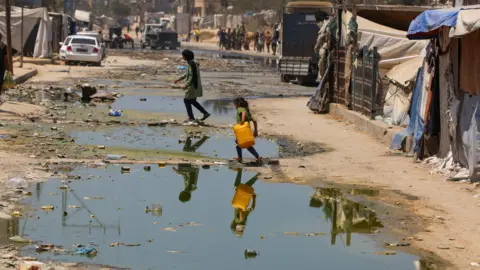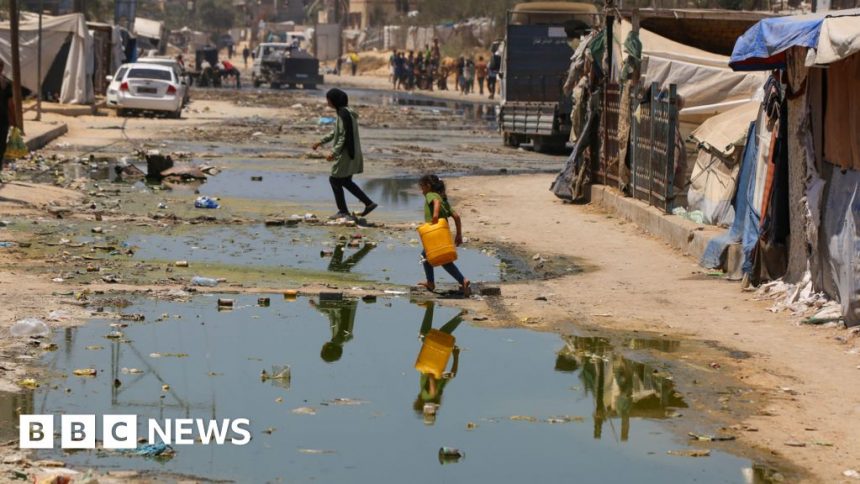WHO ‘extremely worried’ about possible Gaza polio outbreak
 Getty Images
Getty ImagesThe World Health Organization is “extremely worried” about the possibility of an outbreak of the highly infectious polio virus in Gaza after traces were found in wastewater.
Dr Ayadil Saparbekov, head of the WHO’s team in the Palestinian territories, told reporters that a risk assessment was being implemented and that in the meantime health workers in Gaza were providing protection advice to the 2.3 million population.
But, he added, it would be “very difficult” for people to follow it, given the breakdown of water and sanitation services.
Traces of polio – which is spread through faecal matter – were found in sewage samples collected from two different sites in Gaza a month ago, indicating that the virus may be circulating.
No associated paralytic cases have been recorded so far. But the Israeli military said on Sunday that it had begun vaccinating its soldiers.
The WHO and the UN children’s agency (Unicef) believe a mass vaccination campaign may be needed in Gaza.
However, the repeated delays for aid workers and humanitarian supplies getting into Gaza, and huge security risks moving around the territory, mean an effective campaign will be very challenging.
The Israeli military said it was working with various organisations to deliver vaccines to Palestinians in Gaza. About 300,000 vaccines had been sent to the territory since the beginning of the war between Israel and Hamas in October, it added.
Polio is caused by a virus which spreads easily through contact with the faeces of an infected person, or less commonly through droplets when they cough or sneeze. It can cause paralysis and, in extreme cases, death.
The WHO says immunisation rates in Gaza and the occupied West Bank were optimal before the conflict. Polio vaccine coverage was estimated at 99% in 2022, although it had declined to 89% last year, according to the latest data.
But, according to the UN agency, the “decimation” of Gaza health system – with only 16 out of the territory’s 36 hospitals partially functional – as well as the “lack of security, access obstruction, constant population displacement, shortages of medical supplies, poor quality of water and weakened sanitation” have contributed to reduce immunisation rates and increase the risk of diseases spreading.
Dr Saparbekov said many people were living in shelters with just one toilet for 600 people, and had little access to safe drinking water.
Gaza’s Hamas-run health ministry warned last Thursday of a “health catastrophe” in response to the detection of polio in what it said was wastewater flowing “between displacement camp tents and in inhabited areas”.
The WHO has stressed that a ceasefire is essential to allow an effective response.
Eight Israeli public health professors made the same appeal in an op-ed published in the Haaretz newspaper on Tuesday, warning that those at greatest risk were Palestinian and Israeli infants who have not completed their required vaccinations.
“We know what needs to be done. It must be done for the sake of all residents of the region. This is not about politics. This is about health and life,” they wrote.







